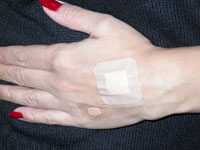Prevention
How can I keep it from spreading?
The best way to avoid getting molluscum is by following good hygiene habits. Remember that the virus lives only in the skin and once the lesions are gone, the virus is gone and you cannot spread the virus to others.
Wash your hands
There are ways to prevent the spread of molluscum contagiosum. The best way is to follow good hygiene (cleanliness) habits. Keeping your hands clean is the best way to avoid molluscum infection, as well as many other infections. Hand washing removes germs that may have been picked up from other people or from surfaces that have germs on them. See the Handwashing site for more information.
Don’t scratch or pick at molluscum lesions
It is important not to touch, pick, or scratch skin that has lesions, that includes not only your own skin but anyone else’s. Picking and scratching can spread the virus to other parts of the body and makes it easier to spread the disease to other people too.

Here's an example of two types of watertight bandages you can find in your local drugstore. Image courtesy Edie Lederman, MD, CDC.
Keep molluscum lesions covered
It is important to keep the area with molluscum lesions clean and covered with clothing or a bandage so that others do not touch the lesions and become infected. Do remember to keep the affected skin clean and dry.
Any time there is no risk of others coming into contact with your skin, such as at night when you sleep, uncover the lesions to help keep your skin healthy.
Be careful during sports activities
Do not share towels, clothing, or other personal items.
People with molluscum should not take part in contact sports like wrestling, basketball, and football unless all lesions can be covered by clothing or bandages.
Activities that use shared gear like helmets, baseball gloves and balls should also be avoided unless all lesions can be covered.
Swimming should also be avoided unless all lesions can be covered by watertight bandages. Personal items such as towels, goggles, and swim suits should not be shared. Other items and equipment such as kick boards and water toys should be used only when all lesions are covered by clothing or watertight bandages.
Other ways to avoid sharing your infection
Do not shave or have electrolysis on areas with lesions.
Don’t share personal items such as unwashed clothes, hair brushes, wrist watches, and bar soap with others.
If you have lesions on or near the penis, vulva, vagina, or anus, avoid sexual activities until you see a health care provider.
- Page last reviewed: May 11, 2015
- Page last updated: May 11, 2015
- Content Source:


 ShareCompartir
ShareCompartir